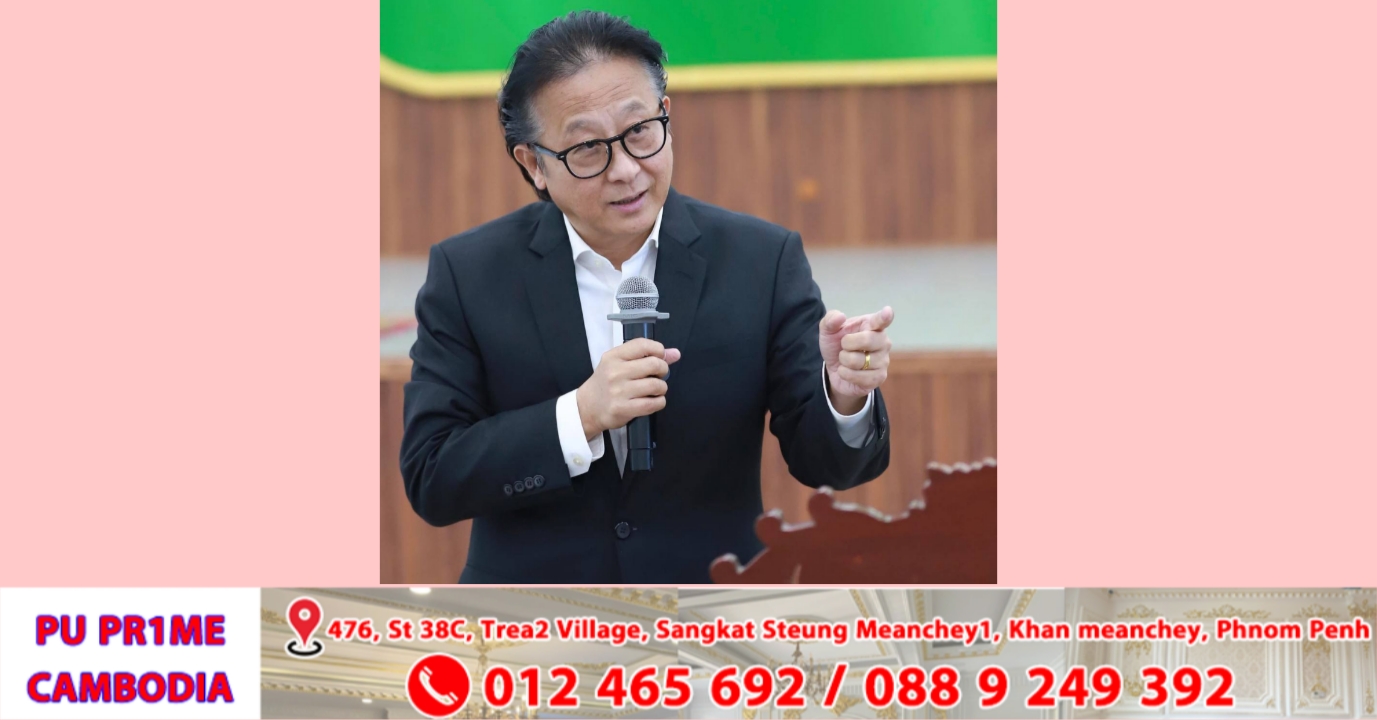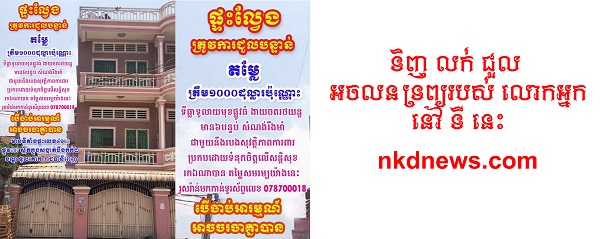ភ្នំពេញ ៖ លោក ហ្សង់ ហ្វ្រង់ស័រតាន់ រដ្ឋមន្ត្រីប្រតិភូអមនាយករដ្ឋមន្ត្រី បានលើកថា ៖ បើសិនជាបទឈប់បាញ់ត្រូវរំលាយ, អ្នកបង្កហេតុនេះនឹងមិនអាចជាអ្នកណាផ្សេងក្រៅតែពីថៃ ក្នុងនោះលោកលើកចំណុចសំណុចសំខាន់ៗចំនួន ៨ដូចខាងក្រោម ៖
1.បើសិនជាបទឈប់បាញ់ត្រូវរំលាយ, អ្នកបង្កហេតុនេះនឹងមិនអាចជាអ្នកណាផ្សេងក្រៅតែពីថៃ។ នេះជាការពិត១០០ភាគរយ។ ប្រវត្តិសាស្ត្រ, ឡូស៊ីកយោធា, និងរចនាសម្ព័ន្ធនៃអំណាច សុទ្ធ សឹងជាអំណះអំណាងប្រកែកមិនបាន…
2.ចុងក្រោយនេះ, សង្គ្រាម៥ថ្ងៃ(២៤-២៨កក្កដា២០២៥)រវាងកម្ពុជា និងថៃ មិនមែនកើតចេញមកពីការមិនយល់គ្នានោះទេ។ វាគឺជាការឈ្លានពានមួយថ្មីពីសំណាក់ថៃមកលើកម្ពុជា, ដូចដែលធ្លាប់មានមកជាហូរហែ នៅក្នុងប្រវត្តិសាស្ត្រ ៖
-នៅឆ្នាំ១៩៥៤ ទ័ពថៃចូលកាន់កាប់ប្រាសាទព្រះវិហារ
-នៅឆ្នាំ២០០៨ ទ័ពថៃចូលលុកលុយវត្តកែវសិក្ខាគិរីស្វារៈ
-នៅឆ្នាំ២០២៥នេះ ទ័ពថៃបង្កហេតុដូចគ្នា លើកនេះនៅប្រាសាទតាមាន់ធំវិញម្តង…
លើកណាក៏ដូចលើកណា, កម្ពុជាគ្មានធ្វើអ្វីផ្សេង ក្រៅតែពីការពារខ្លួនប៉ុណ្ណោះ។ លើកណាក៏ដូចលើកណា, សេណារីយ៉ូប្រព្រឹត្តទៅ តាមបែបតែមួយ ៖ ថៃបង្ករឿង, កម្ពុជាឆ្លើយតប, រួចហើយថៃចោទថា កម្ពុជារករឿង គេគ្រាន់តែឆ្លើយតប។
3.ទ័ពកម្ពុជា ជាទ័ពមួយតូច, ទ័ពខ្វះថវិកា, ទ័ពការពារសុទ្ធសាធ, មិនមែនជាកម្លាំងមួយវាយលុកទេ។ ទ័ពនេះគ្មានលទ្ធភាពហើយក៏គ្មានដែរវប្បធម៌នៃយុទ្ធសាស្ត្រលើកទ័ពទៅវាយប្រហារគេមុន។ ថៃវិញ, ជាទ័ពខ្លាំងជាងគេបង្អស់មួយ នៅអាសុីអាគ្នេយ៍។ ទ័ពថៃទទួលបានការបង្ហាត់ហ្វឹកហ្វឺនខ្ពស់, មានបរិក្ខារនិងសព្វាវុធច្រើនហួសតម្រូវការ។ ម្ល៉ោះហើយ, ជឿឬចោទថាកម្ពុជា ជាអ្នកផ្តួចផ្តើមសង្គ្រាមមួយនេះ គឺជាការណ៍មួយមិនទំនង និងមិនសមហេតុផល ទាល់តែសោះ។ អ្នកខ្សោយជាងមិនចេះរករឿងអ្នកខ្លាំងជាង។ អ្នកខ្សោយជាងចេះទប់ទល់, ចេះដកខ្លួន និងចេះត្រឹមស្រោចស្រង់ជីវិតខ្លួនឯងប៉ុណ្ណោះ។
4.លក្ខណៈខុសគ្នារវាងកម្ពុជានិងថៃ មិនមែនមានត្រឹមតែក្នុងវិស័យយោធាទេ។ វាក៏មានជាក់ស្តែងដែរ នៅក្នុងប្រព័ន្ធនិងស្ថាប័នគ្រប់គ្រង។ នៅកម្ពុជា, អ្វីក៏នឹងមិនអាចប្រព្រឹត្តទៅបានដែរ បើគ្មានការសម្រេចចិត្តទេ ពីអំណាចកណ្តាល។ ទ័ពកម្ពុជានឹងមិនអនុវត្តទេ បើគ្មានបទបញ្ជាច្បាស់លាស់។ មិនអាចមានទៅកើតទេ ការផ្តួចផ្តើមធ្វើសង្គ្រាមពីសំណាក់យោធាកម្ពុជា បើរាជ រដ្ឋាភិបាលកម្ពុជា មិនចេញបញ្ជា។ នៅថៃផ្សេង, កងទ័ពធ្វើស្រេចតែអំពើចិត្ត។ កងទ័ពស្តាប់បង្គាប់តែខ្លួនឯង។ ដោយហេតុតែអនាធិបតេយ្យបែបនេះ, ទ័ពថៃជាស្ថាប័នមួយគ្រោះថ្នាក់បំផុត, ពិបាកនឹងមើលចិត្តធ្លុះ, ពិបាកនឹងទុកចិត្តបាន ក្នុងការធានាការពារសន្តិភាពយូរអង្វែង។
5.បទឈប់បាញ់កម្ពុជា-ថៃ ចុះថ្ងៃ២៨កក្កដា២០២៥ មានលក្ខណៈផុយស្រួយ។ នៅត្រង់ថា ការបន្តអនុវត្តវា មិនអាស្រ័យលើកម្ពុជា។ ល្គឹកណាថៃសម្រេចថានៅតែអនុវត្តវា ល្គឹកនោះ វានឹងបន្តមានសុពលភាព។ កម្ពុជាមិនចង់ធ្វើសង្គ្រាមទេ។ កម្ពុជាមិនស្វែងរកការសងសឹកហើយក៏មិនចង់ធ្វើឱ្យអ្នកណាម្នាក់អាម៉ាស់មុខដែរ។ កម្ពុជាចង់បានសន្តិភាព។ គឺជាជម្រើសរបស់កម្ពុជា, តាំងពីឆ្នាំ១៩៩៨មកម្ល៉េះ។ កម្ពុជា, ក្រោយពីបានហែលឆ្លងកាត់សមុទ្រភ្លើងពីរ និងសមុទ្រឈាមមួយ, ជ្រើសរើសការអភិវឌ្ឍជាអាទិភាពចំបង។ ហើយការអភិវឌ្ឍទាមទារលក្ខខណ្ឌមួយ នោះគឺស្ថិរភាព។
6.យ៉ាងណាក៏ដោយ, ត្រូវច្បាស់លាស់ជាមួយគ្នា ៖ អ្វីក៏កម្ពុជានឹងមិនលះបង់ចោលដែរ។ ដីមួយម៉ែត្រក្រឡាក៏មិនឱ្យបាត់ បូរណភាពមួយចំណិតក៏មិនឱ្យបង់។
7.ត្រូវតែគោរពបទឈប់បាញ់។ នេះគឺជាកាតព្វកិច្ច។ ហើយការតាមឃ្លាំមើលការអនុវត្តបទឈប់បាញ់ ក្នុងក្របខណ្ឌតំបន់និងអន្តរជាតិ គឺជាផ្នែកមួយសំខាន់ណាស់ ពីពេលនេះតទៅ។
8.តាំងពីឆ្នាំ១៩៥៤មក, សង្គ្រាម៥ថ្ងៃ(២៤-២៨កក្កដា២០២៥) ជាសង្គ្រាមសាហាវឃោរឃៅជាងគេ និងដែលបង្កឱ្យមានអ្នកស្លាប់ច្រើនជាងគេ រវាងកម្ពុជា និងថៃ។ សង្គ្រាមបែបនេះ មិនត្រូវកើតឡើងជាថ្មីសោះឡើយ។ កម្ពុជានៅតែឈោងដៃទៅរកចាប់ដៃថៃ។ ប៉ុន្តែ កម្ពុជារក្សាការចងចាំរបស់ខ្លួនឱ្យនៅរស់រវើក និងក្តីថ្លៃថ្នូររបស់ខ្លួនឱ្យនៅឋិតថេ ជារៀងរហូត៕
————————————
1. If the ceasefire were to be broken, it could only come from Thailand. That is a certainty. History, military logic, and the structure of power confirm it.
2.The Five-Day War (24–28 July 2025) was not the result of a misunderstanding. It is part of a long sequence of Thai aggressions:
-In 1954, occupation of the Preah Vihear temple.
-In 2008, troop deployment following the UNESCO inscription.
-In 2025, weapons speak again.
And as always, Cambodia has only defended itself.
Each time, the scenario is identical:
A provocation from Thailand, a Cambodian response, then the accusations are reversed.
3. Our army is modest. Defensive. Underfunded, disciplined, without an offensive doctrine. It has neither the capacity nor the strategic culture to launch an attack. Opposite it: the Thai army—one of the most powerful forces in Southeast Asia. Equipped, trained, overarmed.
Therefore, imagining that Phnom Penh wanted this war is absurd. The weak do not provoke the strong. They resist, retreat, survive.
4. The difference between our two nations is not limited to armament. It also lies in our institutions.
In Cambodia, nothing happens without a decision from the central authority. The army acts only on a clear order. There can be no war without a political directive.
In Thailand, it is the opposite. The army often acts alone. It obeys only itself. This chaos makes it dangerous. And unpredictable. Unable to guarantee lasting peace.
5. The ceasefire is fragile. But it does not depend on us. It holds… as long as Bangkok decides so.
We do not want war. We seek neither revenge nor humiliation. We want peace. That has been our choice since 1998. Cambodia, after having passed through two oceans of fire and one ocean of blood, has chosen the path of development. And development requires one thing: stability.
6.But let this be clear: we will not give up anything.
Not one meter of our territory. Not a single fragment of our sovereignty.
7.The ceasefire must be respected. It is an obligation.
And its monitoring—both regional and international—is now essential.
8.The Five-Day War was the most brutal, the deadliest. It must never happen again. Our hand remains extended. But our memory is vivid. And our dignity, intact…
———————-
1. Si le cessez-le-feu devait être rompu, cela ne pourrait venir que de la Thaïlande. C’est une certitude. L’histoire, la logique militaire et la structure des pouvoirs le confirment.
2. La guerre des cinq jours (24–28 juillet 2025) n’est pas le fruit d’un malentendu. Elle s’inscrit dans une longue suite d’agressions thaïlandaises :
-En 1954, occupation du temple de Preah Vihear.
-En 2008, déploiement de troupes après l’inscription à l’UNESCO.
-En 2025, les armes parlent encore.
Et comme toujours, le Cambodge s’est contenté de se défendre. À chaque fois, le scénario est identique :
une provocation venue de Thaïlande, une réponse cambodgienne, puis des accusations inversées.
3.Or, notre armée est modeste. Défensive. Sous-financée, disciplinée, sans doctrine offensive.
Elle n’a ni la capacité ni la culture stratégique de l’attaque. Face à elle : l’armée thaïlandaise, l’une des forces les plus puissantes d’Asie du Sud-Est. Équipée, entraînée, surarmée. Par conséquent, imaginer que Phnom Penh ait voulu cette guerre relève de l’absurde.
Le faible ne provoque pas le fort. Il résiste, recule, survit.
4. La différence entre les deux nations ne se limite pas aux armements. Elle tient aussi aux institutions.
Au Cambodge, rien ne se fait sans décision du pouvoir central. L’armée n’agit qu’avec un ordre clair. Il ne peut y avoir de guerre sans directive politique.
En Thaïlande, c’est l’inverse. L’armée agit souvent seule. Elle n’obéit qu’à elle-même. Ce chaos la rend dangereuse. Et imprévisible. Incapable de garantir une paix durable.
5. Le cessez-le-feu est fragile. Mais il ne dépend pas de nous. Il tient… tant que Bangkok le décide. Nous ne voulons pas la guerre. Nous ne cherchons ni revanche, ni humiliation. Nous voulons la paix. C’est notre choix depuis 1998. Le Cambodge, après avoir traversé deux océans de feu et un océan de sang, a fait le pari du développement. Et le développement exige une chose : la stabilité.
6.Mais que cela soit clair : nous ne céderons rien.
Ni un mètre de notre territoire. Ni un fragment de notre souveraineté.
7.Le cessez-le-feu doit être respecté. C’est une obligation. Et sa surveillance, à l’échelle régionale comme internationale, est désormais indispensable.
8. La guerre des cinq jours a été la plus brutale, la plus meurtrière. Elle ne doit jamais se reproduire.
Notre main reste tendue. Mais notre mémoire est vive. Et notre dignité, intacte…៕
ដោយ ៖ សិលា










